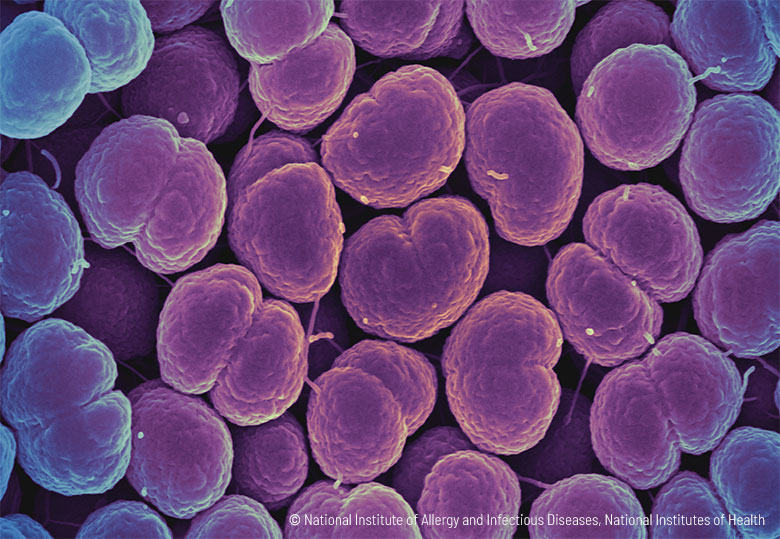
ANRS DOXYVAC: final analysis may modify interim results of this trial assessing the effectiveness of meningococcal B vaccination in preventing gonococcal infections
ANRS | Emerging Infectious Diseases will commission an independent audit
Last updated on 24 May 2023
The effectiveness of the meningococcal B vaccine (Bexsero®) in reducing the risk of gonococcal infections, as announced in February 2023 on the basis of an interim analysis of the ANRS DOXYVAC trial, was challenged in the final analysis. Indeed, a discrepancy between the interim and the final analysis was identified. This discrepancy does not affect the effectiveness of doxycycline in the prevention of sexually transmitted infections (STIs), nor the safety or tolerability of the vaccine. The ANRS | Emerging Infectious Diseases has decided to conduct an independent audit before releasing the final study results.
This study, sponsored and funded by the ANRS | Emerging Infectious Diseases in partnership with Roche (1), was conducted by research teams from the Paris Public Hospitals Group AP-HP, University of Paris Cité, Inserm, and Sorbonne University within the PREVENIR cohort in collaboration with the community groups AIDES and Coalition PLUS.
The ANRS DOXYVAC study objective is to evaluate the effectiveness of: (i) a meningococcal B vaccine (Bexsero°) in reducing the risk of gonococcal infection occurrence and; (ii) doxycycline as a post-exposure prophylaxis of bacterial sexually transmitted infections (STIs) when this antibiotic is taken within 24-72 hours after sexual intercourse.
Following the results of the U.S. DoxyPEP trial, presented at the International AIDS Conference in Montreal in July 2022 and published since in the New England Journal of Medicine, which showed the effectiveness of doxycycline to prevent bacterial STIs, an interim analysis of the ANRS DOXYVAC study was conducted in early September 2022 following the request of the independent study committee (DSMB). This interim analysis took into account data from participants up to July 15, 2022. It showed a significant reduction in the risk of syphilis, gonorrhea, and Chlamydia infections, with doxycycline post-exposure prophylaxis, as well as a significant reduction in gonorrhea incidence in participants who received the meningococcal B vaccine.
Based on these positive results, the DSMB recommended to stop the study and that all the participants be offered doxycycline and/or the meningococcal B vaccine. These recommendations were endorsed by the trial’s Scientific Advisory Board and the ANRS | Emerging Infectious Diseases.
These data were presented at the CROI Conference on February 23, 2023 in Seattle, USA.
From September 20, 2022, study inclusions were discontinued and a new visit was scheduled for all participants until the end of February 2023 for a final analysis. At this visit, participants were offered doxycycline and/or meningococcal B vaccination.
The new data collected since July 2022 have just been monitored and analyzed, and on this occasion the Center for Methodology and Management, which supervised the study and conducted the analysis, noted a discrepancy between the results of the interim analysis and those of the final analysis. This discrepancy involved only one outcome of the trial, the effectiveness of the meningococcal B vaccine on gonococcal infections. It did not affect the effectiveness of post-exposure prophylaxis with doxycycline, which significantly reduced the incidence of STIs. There were no changes regarding the safety and tolerability of the vaccine.
This discrepancy on the effectiveness of the meningococcal vaccine between the interim and the final analysis is explained by the fact that a number of gonococcal infections were not included in the interim analysis.
Consequently, the ANRS | Emerging Infectious Diseases and the coordinating investigator, Prof. Jean-Michel Molina (Université Paris Cité and the Infectious Diseases Department of the Saint-Louis and Lariboisière Hospitals, AP-HP) decided to set up an independent audit of this study and a reanalysis of the results. This audit will be conducted as soon as possible to provide participants and the scientific community with complete results on the effectiveness of the meningococcal B vaccine in preventing gonococcal infections. During this period, participants will continue to be followed by their physicians.
The ANRS | Emerging Infectious Diseases has sent this information, as well as prevention recommendations, to all participants in the study through a letter approved by the French Ethics Committee for the Protection of Persons (CPP).
The ANRS | Emerging Infectious Diseases, the coordinating investigator and the project team remain fully committed to ensure transparency and are doing their utmost efforts to ensure that consolidated results can be released as soon as the independent audit and the re-analysis of the results are completed.
According to Prof. Jean-Michel Molina, “at this stage, we cannot draw any conclusions regarding the effectiveness of meningococcal B vaccination in preventing the risk of gonococcal infections. It is now necessary to wait for the results of an independent investigation before being able to discuss the potential effectiveness of this vaccine”.
Prof. Yazdan Yazdanpanah, Director of the ANRS | Emerging Infectious Diseases, adds that “transparency on the conduct of this study will be ensured, so that reliable results can be communicated to all“.
1. Roche Molecular System and Roche Diagnostics France donated kits to detect Chlamydia trachomatis, Neisseria gonorrhoeae and Mycoplasma genitamium by PCR in this study.
More information:
Press release, February 23, 2023: New data of efficacy of a Meningococcal B Vaccine and a Preventive Antibiotic in Reducing the Risk of Bacterial STIs and proven efficacy of the MVA-BN Vaccine Against Mpox
Press contacts:
ANRS | Emerging Infectious Diseases: information@anrs.fr
Université Paris Cité: presse@u-paris.fr
Sorbonne Université: claire.de_thoisy-mechin@sorbonne-universite.fr
Inserm: presse@inserm.fr
AP-HP: service.presse@aphp.fr
AIDES: mcherrid@aides.org
